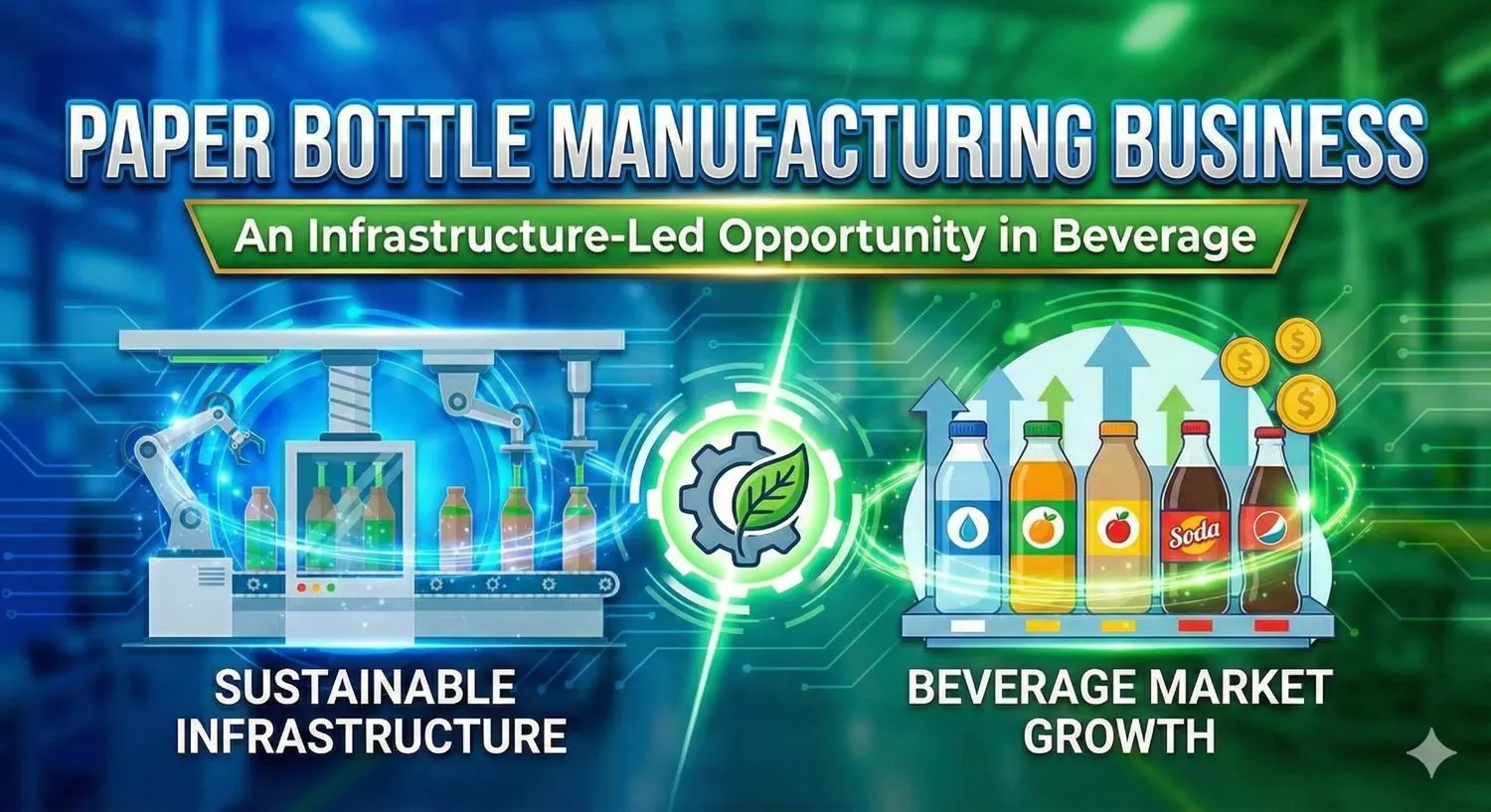
IV Fluids Manufacturing with FFS Technology are essential in healthcare. They hydrate patients, deliver medications, and restore electrolyte balance in critical conditions. Hospitals, clinics, and ambulances constantly rely on intravenous fluids. Due to rising healthcare demand and expanding hospital infrastructure, IV fluids manufacturing is now a highly profitable business opportunity.
Contents
- 1 Introduction to IV Fluids Manufacturing and FFS Technology
- 1.1 Types of IV Fluids and Their Uses
- 1.2 Form-Fill-Seal (FFS) Technology Explained
- 1.3 Raw Materials and Composition
- 1.4 Manufacturing Process Flow
- 1.5 Quality Control and Assurance
- 1.6 Packaging and Storage Guidelines
- 1.7 Licensing and Regulatory Requirements
- 1.8 Business Potential and Profitability
- 1.9 Sustainability and Automation
- 1.10 Conclusion
Introduction to IV Fluids Manufacturing and FFS Technology
The manufacturing of IV fluids involves precision, hygiene, and compliance with pharmaceutical regulations. These fluids must be sterile, free from contaminants, and correctly formulated. The introduction of Form-Fill-Seal (FFS) technology has revolutionized production, improving both safety and efficiency. FFS technology automates the entire process, reducing human contact and ensuring higher sterility levels.
This guide explores the types of IV fluids, raw materials, FFS production technology, packaging methods, regulatory requirements, and business potential in IV fluids manufacturing.
See Also – Dairy & Cocoa Products
Types of IV Fluids and Their Uses
IV fluids fall into two main categories: crystalloids and colloids. Crystalloids are the most common and include saline, dextrose, and Ringer’s lactate. Colloids contain larger molecules and include solutions like dextran and albumin.
Here are the most used IV fluids in healthcare:
-
Normal Saline (0.9% Sodium Chloride): Used for dehydration and flushing.
-
Dextrose 5%: Provides energy and maintains fluid balance.
-
Ringer’s Lactate: Preferred in trauma, burns, and surgical procedures.
-
Combination Fluids: Contain dextrose and saline for patients needing both electrolytes and glucose.
Each fluid serves a different purpose. Hospitals must stock multiple types based on medical needs. This variety increases the demand for diversified production capabilities in IV fluids manufacturing units.
Form-Fill-Seal (FFS) Technology Explained
Form-Fill-Seal (FFS) is an advance method where plastic containers are formed, filled with sterile solution, and sealed in one continuous, automate process. This technology ensures high levels of hygiene and significantly reduces contamination risks.
The FFS system uses polymer films, typically polypropylene or polyethylene, which are thermoform into bottles or pouches. Once the shape is form, the fluid is filled in a sterile environment and the container is seal immediately.
Benefits of FFS in IV fluids manufacturing:
-
No manual handling of fluids or containers
-
Reduced contamination risk due to a closed system
-
Cost-effective for large-scale production
-
High-speed output, ideal for mass production
-
Better shelf life with tamper-proof packaging
FFS machines can be single-cavity or multi-cavity, depending on output requirements. Modern systems can produce thousands of IV bottles or pouches daily, ensuring business scalability.
Raw Materials and Composition
The basic raw materials for IV fluids include purified water, salts (such as sodium chloride, potassium chloride), dextrose (glucose), and other additives like calcium or magnesium salts.
Water used in IV solutions must meet the standards of Water for Injection (WFI). This water is highly purified and produced using distillation or reverse osmosis systems.
Additional components required:
-
Primary Packaging Film: Medical-grade multilayer film used for forming containers
-
Caps and Ports: Allow for drug infusion and connections to IV sets
-
Labeling Material: Printed with fluid details, batch number, manufacturing and expiry dates
Maintaining raw material quality is critical. Each component must be tested before use to ensure patient safety and regulatory compliance.
Manufacturing Process Flow
The process of IV fluids manufacturing using FFS technology includes several controlled steps:
-
Water Purification: Water is filtered and treated to become Water for Injection (WFI).
-
Solution Preparation: Salts or dextrose are dissolved in WFI in stainless steel tanks.
-
Filtration: The solution is filtered through 0.22-micron filters to remove microorganisms.
-
Sterilization: The solution is sterilized using heat or membrane filters.
-
FFS Operation:
-
Form: The container shape is created from plastic film.
-
Fill: The sterile solution is filled into the container.
-
Seal: The container is heat-sealed and separated.
-
-
Leak Testing: Each unit is tested for seal integrity.
-
Labeling and Packaging: Final products are labeled, packed, and sent to storage.
Throughout the process, machines are cleaned and sterilized regularly. This ensures consistent quality and prevents cross-contamination between batches.
Quality Control and Assurance
In pharmaceutical manufacturing, quality control is non-negotiable. IV fluids are classified as sterile products, and failure to meet safety standards can result in serious patient risks.
Important tests during IV fluids manufacturing:
-
pH Test: Ensures the fluid’s acidity is within acceptable range
-
Osmolarity Test: Confirms electrolyte concentration is accurate
-
Sterility Test: Confirms product is free from microbes
-
Particulate Matter Test: Checks for visible or microscopic particles
-
Container Integrity Test: Ensures no leaks or sealing faults
Testing is conduct at multiple stages—during raw material intake, in-process manufacturing, and after final packaging. Every batch must pass these tests before release.
Good Manufacturing Practices (GMP) and compliance with World Health Organization (WHO) or local drug control authority standards are mandatory.
Packaging and Storage Guidelines
Proper packaging enhances the safety, stability, and usability of IV fluids. Containers made using FFS are flexible yet strong. These pouches or bottles must withstand pressure, temperature changes, and transport vibrations.
Packaging features:
-
Tamper-proof caps
-
Drug injection ports
-
Clear labeling for easy identification
-
Multiple sizes: 100ml, 250ml, 500ml, 1000ml
Storage conditions:
-
Store at temperatures between 15°C and 25°C
-
Avoid exposure to direct sunlight
-
Stack in ventilated and dust-free storage rooms
Inventory must be rotate base on first-expiry-first-out (FEFO) method. This prevents product waste and ensures timely supply to hospitals and distributors.
Licensing and Regulatory Requirements
Setting up an IV fluids manufacturing unit requires approvals from central and state drug authorities. The facility must meet all pharmaceutical infrastructure standards and safety norms.
Licenses and registrations required:
-
Drug Manufacturing License under Drug and Cosmetics Act
-
Good Manufacturing Practice (GMP) Certification
-
Pollution Control Board Clearance
-
Factory License and Trade License
-
Fire Safety and Building Safety Certificates
Compliance with Pharmacopoeia standards (IP, USP, BP) is also mandatory. Any deviation from formulation, packaging, or labeling norms can lead to license suspension or cancellation.
Regular inspections and audits ensure continued compliance. Keeping all batch records and testing logs up to date is essential.
Business Potential and Profitability
The demand for IV fluids is growing rapidly across the world. Hospitals, emergency care centers, and rural health missions require a steady supply of sterile fluids. With public and private healthcare investment increasing, the scope for IV fluids manufacturing is wide.
Major business advantages:
-
High Demand: Daily requirement in all healthcare facilities
-
Evergreen Market: Healthcare runs year-round regardless of economic trends
-
Export Potential: Many countries import quality IV fluids
-
Scalable Model: Start with one line, expand with demand
Initial investment depends on plant size, capacity, and equipment type. A small-scale unit with semi-automatic systems may require ?2–3 crores. A large-scale fully automatic plant with FFS technology could cost ?8–10 crores.
Profit margins are stable. With bulk production and hospital tie-ups, ROI can be Acehive within 3–5 years. Export markets offer additional profitability due to better pricing and volume demand.
Sustainability and Automation
Modern IV fluids manufacturing units focus on sustainable practices. FFS technology consumes less energy and reduces material wastage compared to older glass bottle systems.
Sustainability practices include:
-
Using recyclable plastic films
-
Treating wastewater from cleaning operations
-
Installing solar panels to reduce energy costs
-
Automating material handling to cut labor use
Automation also improves traceability. Machines with SCADA systems and electronic batch recording help reduce errors and improve transparency in production.
These improvements make the manufacturing process faster, safer, and more cost-effective.
See Also – Cereal Food Processing
Conclusion
IV fluids are a cornerstone of modern medical treatment. The demand for safe, sterile, and affordable fluids is rising consistently. Adopting Form-Fill-Seal technology enhances production speed, hygiene, and shelf life, making it ideal for modern pharmaceutical manufacturing.
Starting an IV fluids manufacturing business is a wise step for entrepreneurs interest in the healthcare sector. With the right technology, compliance, and quality assurance, the business offers long-term stability and global market potential.
By focusing on safety, sustainability, and scalability, you can build a profitable and trusted brand in the pharmaceutical industry.














